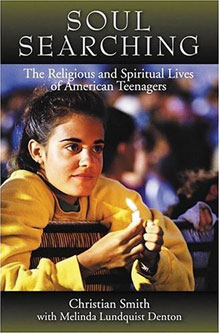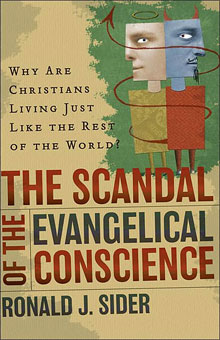Apostolic Devotion: The Actual Historical Tradition
For Sunday April 17, 2005
Lectionary Readings (Revised Common Lectionary, Year A)
Acts 2:42–47
Psalm 23
1 Peter 2:19–25
John 10:1–10
 |
First the good news. In their ground-breaking National Study of Youth and Religion funded by the Lilly Endowment, the results of which are published in their new book Soul Searching: The Religious and Spiritual Lives of American Teenagers (Oxford University Press, 2005), sociologists Christian Smith and Melinda Lundquist Denton of the University of North Carolina (Chapel Hill) document that teenagers overwhelmingly admire their parents as the single greatest influence in their lives, and gladly imitate their religious beliefs. Further, their study showed that teenagers actually like church. The conventional wisdom of teenage alienation from parents and hostility toward religion is an entrenched but erroneous stereotype, they argue.
Now for the bad news. When Smith and Denton asked these teenagers to describe the particulars of their religious faith, they were "incredibly inarticulate" about even the most basic tenets of their beliefs and practices. Rather, the vast majority of kids were abysmally ignorant of the religion they espoused. Here, for example, is the response of a 15-year-old who attends church four or five times a week, when asked to articulate her faith:
[Pause] I don't really know how to answer that. ['Are there any beliefs at all that are important to you? Really generally.'] [Pause] I don't know. ['Take your time if you want.'] I think that you should just, if you're gonna do something wrong then you should always ask for forgiveness and he's gonna forgive you no matter what, cause he gave up his only Son to take all the sins for you, so...
This from their scientific survey of 3,290 teenagers (ages 13-17) and parents, and 267 personal interviews, conducted across four years (2001–2005). Smith and Denton conclude that most "Christian" kids really operate with a vague sort of Moral Therapeutic Deism: be nice, don't do bad, for a remote deity wants you to be happy and feel good about yourself. In other words, says Smith, "we can say here that we have come with some confidence to believe that a significant part of 'Christianity' in the U.S. is actually only tenuously Christian in any sense that is seriously connected to the actual historical Christian tradition."1
Epidemic teenage ignorance is not an isolated phenomenon. I suspect that kids reflect the religious ignorance of adults. In a recent church membership class, for example, during the question and answer time a person asked my pastor why our church did not recite the creeds. Before he could answer, across the room another person interjected: "I love that question; but what's a creed?" Or again, a friend of mine who was educated at elite universities surprised me when he said that he had never even read the Gospels. Finally, twenty-five years ago when I started seminary, schools were so shocked at the Biblical illiteracy of entering seminarians that they instituted required course work and tests to try to insure eventual, basic proficiency.
 |
It comes as no surprise, then, that our profound ignorance about Christian specifics results in life-styles that are barely distinguishable from those of non-believing people. Social-scientific surveys document that evangelical Christians divorce as often as the general population, if not more. When a Gallup poll asked people if they would object if a black neighbor moved in next door, evangelicals and Southern Baptists gave the most racist responses. Physical and sexual abuse in conservative Christian homes mirrors that of the general population2
After their initial pattern of desertion, doubt, despair, confusion and enough raw fear to hide behind locked doors, and then their eyewitness encounters with the risen Christ, the first Jesus followers began to develop a growing awareness of the enormity of what had happened. They began to unpack and query just what it meant to live and think in a specifically, intentionally "Christian" manner. Their beginning (and ending) point was nothing short of preposterous—that Jesus had risen from the dead. The cataclysmic and comprehensive implications of that simple, three-word confession—"Christ is risen!"—began to dawn on them, imposing itself upon them, making claims upon them, and profoundly reordering everything about their lives.
In the reading for this week, the writer-physician Luke pulls back the curtain for us on life among those first believers a few days and weeks after Easter:
They devoted themselves to the apostles' teaching and to the fellowship, to the breaking of bread and to prayer. Everyone was filled with awe, and many wonders and miraculous signs were done by the apostles. All the believers were together and had everything in common. Selling their possessions and goods, they gave to anyone as he had need. Every day they continued to meet together in the temple courts. They broke bread in their homes and ate together with glad and sincere hearts, praising God and enjoying the favor of all the people. And the Lord added to their number daily those who were being saved (Acts 2:42–47).
It began to dawn on those first disciples, and it should dawn on all of us who stand on their shoulders, that "apostolic devotion" to Jesus entailed a commitment to a holistic way of living and thinking, what today we might call faith and practice, or in fancier parlance the development of a distinctively and comprehensive Christian world view.
Rather than an easy-believe-ism characterized by murky religious generalizations, Luke describes believers who gave themselves to plumbing the depths of Christian teaching. Whereas today our American culture encourages avarice, envies accumulation, and celebrates greed, he pictures early Christians whose divested themselves of their wealth for the sake of generous compassion toward the needy. In numerous studies like Robert Putnam's Bowling Alone (2001), social-scientists have documented how disconnected and isolated people feel today, accumulating what Putnam describes as a growing "social-capital deficit" that leaves people in our culture longing for a "more collectively caring community"—which communal caring is exactly the sort of social life that Luke describes in his historical description above.
A Christian style of living that prizes intellectual vibrancy, economic generosity, and communal caring does not happen casually or automatically. It requires intentionality, effort, and choice, or what the apostle Paul called "working out your salvation" (Philippians 2:12). Christians in the Eastern Orthodox tradition have a wonderful word for this, the Greek word nepsis, which might be translated as "vigilance." The "neptic" believer is watchful, alert, on guard and attentive to anything and everything that entails "apostolic devotion" to the Jesus way.
Turning to the Gospel reading for this week, we discover the end or goal of the vigilant and intentional Christian life. Our purpose is decidedly not arid biblicism, financial guilt trips, or enlisting in a small group for the ostensible purpose of "fellowship." Rather, in the words of Jesus, "I have come that you might have life, and have it to the full" (John 10:10). A few decades after Luke's historical description above, the apostle Paul encouraged believers to "take hold of life that is truly life" (1 Timothy 6:19), and not just a pale imitation, however attractive by the world's standards.
[1] For two brief reviews of this book see Andy Crouch, "Compliant But Confused," in Christianity Today, April 2005, p. 98; and Michael Cromartie's interview with Christian Smith, "What American Teenagers Believe," in Books and Culture, January-February 2005, pp. 10–11. Smith is the Stuart Chapin Distinguished Professor of Sociology at UNC and a committed Christian.
[2] For these and other similar conclusions see Ron Sider's new book The Scandal of the Evangelical Conscience (2005).





